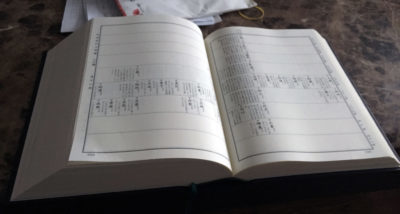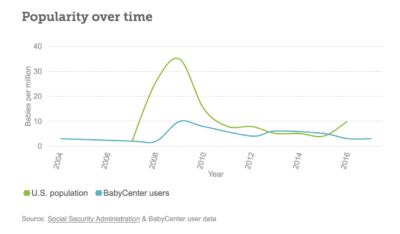 |
Page 399 of my host family’s book of names. It tracks the family back to its roots.
Names
“He knows our true names, Eragon. We are his slaves forever.”
— Christopher Paolini, Eldest
“Jason scratched his head. “You named him Festus? You know that in Latin, ‘festus’ means ‘happy’? You want us to ride off to save the world on Happy the Dragon?”
― Rick Riordan, The Last Hero
Scouring the upper shelves of the lower school library is one of the few elementary school memories that remains. Neck strained from twisting my head sideways to read titles quicker two too many times, my reward was being the first one to check out the newest Magic Tree House chapter or the latest copy of the Redwall series.
Paolini’s Inheritance trilogy and Riordian’s Lightning Thief epics were chief among the hundreds of titles vying for attention. Sure, the dragons and demigods were the hooks that dragged us into their narrative webs. But in hindsight, what keeps them alive in the mind a decade later is how much the imagined conflicts are rooted in real fears.
We are the same as Percy Jackson or Eragon in our struggle to answer a question: What will my name be?
How will I make a name for myself?
What will my name mean once I’m gone?
__
With this context, the parental pressure to jump start their new kid’s success with the right name intensifies. When’s the last time you met someone named Olga who wasn’t older than 67? (last week for me, but that’s besides the point) There’s a few things that can spur intergenerational conflict, and this is definitely one of them.
Unfortunately for my sleep schedule but fortunately for this week’s newsletter content, I found myself holed up in my room wishing the walls were a bit thicker. Byungsun, the son of the Korean grandparents whose house I’m staying in, had his first kid a month ago, and the poor boy still didn’t have a name.
Despite the broad generalizations that come with this claim—Americans have it easy. You pop open Google, search “popular baby names” and settle on one you like.
Or if you’re Korean-American, open the Bible, decide that Ezekiel is too hard to pronounce, struggle figure out if Gabriel is a boy’s or a girl’s name, then give up and compromise, producing the 10,000th John Kim in the world.
On the surface, native Koreans should have it easier—along with the last name, each generation of the family has the same family name. For example, Myung-hee and Seok-hee both share the same last syllable. Apparently the squeezing of options for that last syllable ups the pressure of the decision.
The heated discussion in the living room here was one part debate two parts strategy. Byungsun really wanted “Ji-um 지음,” meant to mean “built by God” according to the hanja, or Korean-Chinese characters. But his dad would never go for that one; it didn’t even have the family name—”Jae 재”—as one of the two syllables.
Out with that name, in with the next attempt: “Min-Jae 민재,” meaning “stacking up rewards in heaven” according to the associated hanja Byungsun wanted. That name went head to head with his father’s preference for “Jae-in 재인,” the same name as the current Korean president, Moon Jae-in (문재인).
Byungsun’s strategy worked—his last second gambit decided what this kid is going to be called for the rest of his life. Will he tell him how he was named? “Of course not.”
An over-dramatization of the naming conundrum? Perhaps. Is it meaningless? Probably not.
You might end up with your foot in your mouth like I did two weeks ago in front of 975 students and 35 teachers, microphone in hand on stage—
[principal, in English] “So your name, Caleb, it is from the Bible, isn’t it?”
[me] “Uh…yes, yes it is.”
[principal to whole auditorium] “Do you all know what Caleb means in the Bible? It means dog. Dog like the animal. Caleb, do you have any special meaning for this name?”
[me, searching furiously for an answer that satisfies the principal, recognizes my Christian faith, but also doesn’t make me look like a total idiot because calling someone a dog in most languages in Korean isn’t the greatest thing to say, all the while trying to look cool]
“Um, sure! Caleb was obedient to God when he was spying on the land of Canaan—*wait does anyone here know what spy and Canaan is*—so he was obedient to God like a dog so God had favor on him…” *wait, did the principal just call me a dog on purpose? Is he indirectly telling me to be obedient and live up to my name in front of all of his students?*
Thankfully most of the students were either sleeping or aren’t at the English level to read between the lines. Or maybe I’m reading into it too much. Regardless, the level of social subtlety needed to successfully navigate Korean daily life isn’t exactly the crown jewel of the country. Maybe I should be using my Korean name, which roughly translates to “shining dragon.” Sure sounds better than “dog.”
 |
Can you guess which name this graph depicts? Starts with a B and rhymes with The Rock.
Link for Life
Taming your Social Survival Mammoth. Link

Leave a Reply